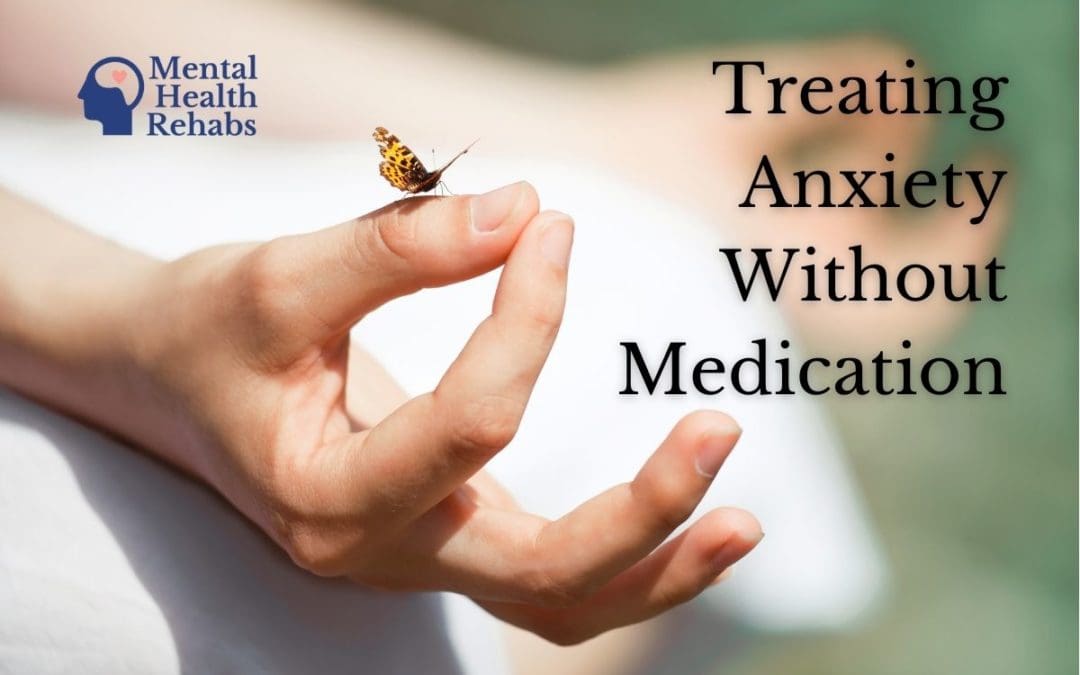Acutely, the heightened stress of an individual with anxiety disorder can impede their ability to participate in work, family, or other social functions or fulfill their responsibilities. Stress-related dysfunction can significantly impact their overall quality of life. Anxiety can be quite harmful in the long run as well. The overactive fight-or-flight response that characterizes anxiety puts immense stress on the body. Anxiety medications can be effective in minimizing the symptoms and making anxiety a manageable condition. However, they are not the only recourse available. In this article, we’ll cover the medications typically used to treat anxiety and how they work, as well as the alternatives for non-pharmacological treatment for anxiety.
The Most Common Prescription Anxiety Medications
There are several neurochemicals involved in the brain abnormalities that cause anxiety: Serotonin, GABA, glutamate, and adenosine, among others. Additionally, these imbalances can be a result of either too much of one (or several) neurochemicals or too little.
This variety of neurochemical origins is largely responsible for the different types of anxiety disorders which is also why there are so many different types of anxiety medications. Each is geared to affect certain neurochemicals in certain ways, which is why some medications are more effective towards particular types of anxiety disorders than others.
Understanding how they work (and for which disorders) is helpful to understand what to look for in an alternative to anxiety medications.
Antidepressants
MAOIs (monoamine oxidase inhibitors), SSRIs (selective serotonin reuptake inhibitors), and tricyclics are all medications initially used to treat depression. However, since there is an overlap between the neurochemicals that cause depression and the ones that cause anxiety, many of these medications can effectively treat both. Specifically, they do so by targeting serotonin and dopamine, the neurotransmitters that control mood regulation.
MAOIs are most often used in treating panic disorder and social phobias, while SSRIs and tricyclics are helpful in managing most types of anxiety disorders. Obsessive-compulsive disorder (OCD) is the exception as none of the three drugs are particularly effective, however.
Benzodiazepines
Benzodiazepines are highly effective at alleviating anxiety symptoms in nearly all its forms. These prescription sedatives work by increasing GABA levels. These neurotransmitters function as muscle relaxants and have a calming effect on the brain as well.
Beta-blockers
Traditionally used to treat heart conditions, beta-blockers have found great success in their off-label use of managing the physical symptoms of anxiety, particularly that of social anxiety disorder. They are able to do so by preventing the stress hormones, norepinephrine and epinephrine, which are responsible for triggering the fight or flight response, from being received in receptors.
Non-pharmacological Treatment For Anxiety
With a basic understanding of what causes anxiety and specifically how anxiety medications help, one will have a better understanding of what to look for in a natural, non-pharmacological alternative to anxiety medication.
Exercise
Aerobic activity is particularly effective in counteracting the symptoms of anxiety. When heart rate increases, it triggers the release of several of the same key neurochemicals that cause anxiety (serotonin and GABA) as well as endocannabinoids and brain-derived neurotrophic factor (BDNF). Physical activity also releases muscle tension which can alleviate (or at the very least, distract) from the physical symptoms of anxiety.
Better still, regular exercise can actually protect a person from anxiety to make them more emotionally resilient and experience lessened mood disturbances. It was even found to be effective for difficult-to-treat anxiety disorders: agoraphobia and PTSD.
Meditation
Meditation is a practice in concentration, focus, and awareness. It is closely related to the concept of mindfulness, both of which help users develop greater control over their thoughts and feelings. Other activities like yoga and tai-chi impart similar benefits.
There is empirical evidence that meditation has health-related benefits along with psychological ones. Studies have shown that it can lessen depressive symptoms, improve memory capacity and attention span, lower emotional volatility and reactivity, and not least of all, reduce stress as a whole. Such skills are invaluable to those whose disorder stems from a feeling of loss of control.
Chamomile
Chamomile isn’t just a soothing tea. An ancient medicinal herb that’s been used for thousands of years, it’s one of the best herbal remedies for anxiety. It is a natural mild sedative whose extract is renowned for inducing feelings of calm in addition to its anti-inflammatory, antioxidant, and astringent capabilities. While chamomile is great for relieving anxiety symptoms, it does not do much for preventative care and provides no long-term change to neurochemical makeup.
Therapy
Speaking with a mental health professional can help individuals get a better understanding of the source of their anxiety which in turn, will give them a better idea of how to overcome their episodes. Cognitive-behavioral therapy is the most commonly used modality in treating anxiety, however, exposure therapy and hypnosis are other effective options that are available. Find out which option is best for you and contact a mental health rehab near you, today.

